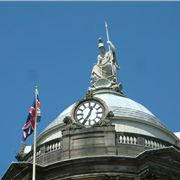MOVES to ban community issues from being discussed at council meetings have been described as death knell for local politics by a former city leader.
On Wednesday the annual meeting of the heavily Labour-dominated council is expected to ban issues affecting individual wards from being debated at city council meetings.
If the move is approved, only matters with a city-wide interest will be included on the agenda.
 Mike Storey: CriticalFor generations city council meetings have been the ultimate people’s forum – discussing issues affecting local communities to matters of national or even international dimension.
Mike Storey: CriticalFor generations city council meetings have been the ultimate people’s forum – discussing issues affecting local communities to matters of national or even international dimension.
Even in the House of Commons during debates, and during Prime Ministers Questions, MPs have the right to raise issues affecting even individual constituents.
Today, former Lib Dem council leader Lord Mike Storey attacked the plan.
“It virtually spells the death knell for local politics,” he said. “In just a few years the citizens of Liverpool have been stopped from publicly presenting their petitions to the council at council meetings. Councillors have been stopped from asking follow-up questions in the chamber and now local issues that could be dear to the hearts of people in individual wards will be blocked.
“It is all about controlling and centralising things and it is not at all good for local democracy.
Our system of local democracy was based on the old time honoured tradition of people being able to petition the monarch to raise matters of concern. Some of my friends in the Labour Party in Liverpool are not at all happy with the current state of affairs."
Items considered to be affecting individuals wards will in future have to be raised with individual select committees. However select committees have no decision making powers or authority.
The council’s own in-house solicitor will sift through items submitted for the council agenda to decide what is in and what is out.
'Sleepwalking'
Cllr Pat Maloney, chief whip for the dwindling Lib Dem group, added: “This shows more than ever how important it is to have an effective opposition voice in this city.
“I am not sure whether people of Liverpool are aware of the attacks on democracy in our city since the introduction of an elected mayor, but more and more we are sleepwalking from democracy into autocracy, if not dictatorship.”
He went on: “What is good for the Mother of Parliaments is unacceptable to the Mayor and Labour councillors of Liverpool. The ability to come to the council meetings to raise any matters is vital. Like the chamber in the Commons, our council chamber is our own parliament where democracy should be seen to be done.
“Through no fault of their own, the select committees are powerless. When we raise issues at council meetings and see Labour referring these matters to select committees it is the equivalent of it being kicked into the long grass.”
It is understood the change is to save time and expense in responding to ward issues, amid claims local issues are often raised by opposition councillors as a form of “electioneering”.
Cllr Maloney added: “When we were in control Labour used the council to raise all manner of things, and that is quite correct. You cannot put a price on hard-won democracy.”
The Laz Word: An elected dictatorship
Modern day democracy in local government - including Liverpool – is more and more becoming an elected dictatorship (writes Larry Neild).
As the 20th century was coming to a close Liverpool had 99 councillors and a string of committees and sub-committees.
Virtually every decision was taken at often-stormy meetings of the city council, and everything was done on a show of hands. Fifty votes or over decided the fate of motions put to the council. It was decision making for the people by the people they elected to make decisions on their behalf.
The dawning of the 21st century, under the presidential-like rule of Prime Minister Blair, saw the biggest change ever in local democracy.
 From 99 to one The old ways were swept aside, in the interests of swifter decision making. Council cabinets became the power brokers and decision makers. In Liverpool, a Lib Dem council at the time, this meant a cabinet of 10 essentially taking the decisions. Opposition members could ‘call in’ cabinet decisions for referral to a select committee. But at the end of the day the cabinet had the last say. The only weapon was persuasion and a little begging for an unpopular decision to be overturned.
From 99 to one The old ways were swept aside, in the interests of swifter decision making. Council cabinets became the power brokers and decision makers. In Liverpool, a Lib Dem council at the time, this meant a cabinet of 10 essentially taking the decisions. Opposition members could ‘call in’ cabinet decisions for referral to a select committee. But at the end of the day the cabinet had the last say. The only weapon was persuasion and a little begging for an unpopular decision to be overturned.
As the council cabinet became the supreme decision maker, the City Council became increasingly powerless. So much so Liverpool reduced the number of council meetings to just a handful each year. There will only be five ordinary city council meetings in the coming 12 months.
A few decision-making powers remain with the full council – all councillors vote on the annual budget at the Council-Tax fixing meeting, and vote in the new Lord Mayor. Apart from that, backbench councillors are all but redundant in decision making.
The decision by Liverpool to switch to an elected mayor changed things ever further. Much credit must go to Mayor Joe Anderson for retaining the full cabinet with him at the helm. But under the law controlling elected mayors, it is his vote that counts. Essentially the mayor can override, should he want to, his own cabinet. That does not appear to happen in Liverpool, but, as has been seen elsewhere, some mayors do their own thing.
In just over a decade decision making power has moved from all-elected councillors to an elected mayor … in Liverpool’s case from 99 councillors to just one person. And whether people are happy with this matters not – they voted in the system. It’s called democracy.













